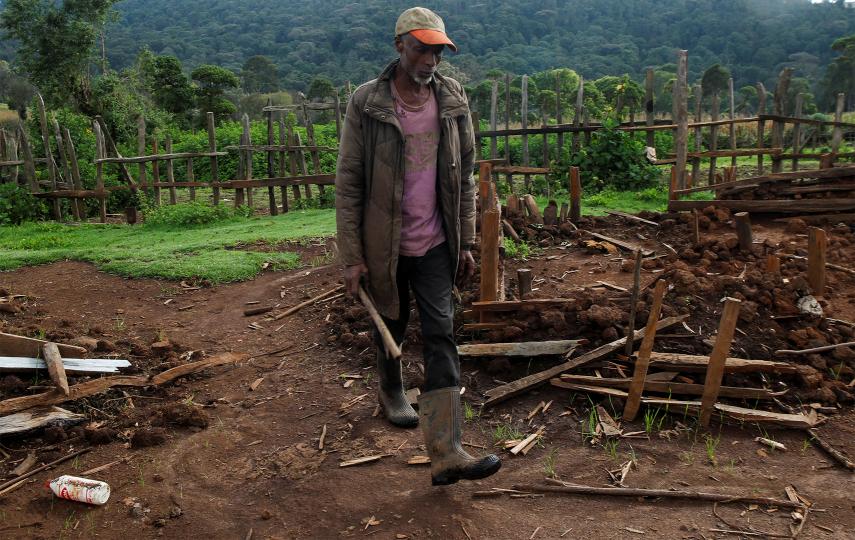The United Nations Development Fund's first National Human Development Report on Pakistan was launched in the capital, Islamabad, on Tuesday, highlighting dangerous work for low pay, child labour, and poor health and education.
The report, which took two years to put together, found that women and children were the most vulnerable and rural Pakistanis at a disadvantage compared to their urban counterparts. The document is the first comprehensive audit of Pakistani social, health, education and economic conditions.
For the first time, the report presents the Human Development Index (HDI) at the provincial and district levels. New data suggests not only that there is a high prevalence of disease among the poor, but also that disease is a major trigger driving households into poverty. The HDI comprises three main elements: standard of living, lifespan and literacy level.
"In terms of HDI ranking, Sindh has the highest rank, with an HDI of 0.659, which is higher than for Pakistan as a whole [0.541]. Punjab urban comes out second in the ranking, with an HDI of 0.657, NWFP [North West Frontier province] urban third, with an HDI of 0.627, and Balochistan urban fourth at 0.591," the report said.
Child labour had been thought to be declining in Pakistan due to international pressure and government action. But the report's author, Dr Akmal Hussain, an independent social scientist, said one of the most pressing issues raised in the report was child labour. He estimated the number of child workers in Pakistan to be seven million, and called on the government to tackle on an "emergency basis" the problem of children working in dangerous and often life-threatening conditions.
"It is devastating, children are getting mutilated. They are losing their fingers. They're losing their eyes, because they are using blow torches without goggles. They are getting electrocuted in the workshops, because the wiring is not safe," he said.
Pakistani Education Minister Zubaida Jalal, who attended the launch of the report, told IRIN that the government was committed to moving children from the workplace into schools. Jalal, who is also chair of the parliamentary sub-committe on povery, highlighted current initiatives to give all children basic literacy and professional training, including those previously taken out of school to work, and education programmes for adults who had received no formal education.
"There are those children in child labour who have to have a primary education which gives them a basis towards equipping them with more skills to be able to do a better job. But the reality in Pakistan is such that talking about the elimination of child labour these days is not possible. So, it's a case of trying to give them the right to education," she said.
Jalal added that there was a financial credit scheme to help employers who allow working children to return to school, but remained realistic about the extent of the problem.
The report also recommended that efforts to boost the national economy be supplemented by a "direct attack on poverty". "This would not only increase the quality of life for the population but also create a fitter, more productive workforce," Hussain said.
He stressed that poorer sections of society were kept in a poverty trap without adequate education or health-care provision, and were disenfranchised from the political system. He said he believed that such people, particularly women, should be empowered by giving them the opportunity to express their views. "Autonomous organisations of the poor should be established to enable the poor to have equitable access over markets, over government decision making, and to enable them to acquire technical skills," he said.
Citing an example, Hussain said poorer agricultural workers had to pay more for basic materials, such as seed, and sold their crops for lower prices than richer farmers. Groups of workers from one area could negotiate better prices for their products together, rather than by working against one another in competition. He pointed out that they could also share resources and knowledge about more profitable production methods.
The report recommended big investments in education, skills training and health care for women and children. This followed observations that although the principal wage earner's income usually dictates the standard of living for a family, it is any contribution made by a second earner - usually a wife, but sometimes a child - that determines whether the family can move up and out of the poverty trap.
The education minister said she wanted to relaunch the "model schools" initiative in which school buildings across the country would be used as community centres for health care, family planning advice, adult education and professional development. A previous attempt had seen new schools built across Pakistan which were educationally successful, but failed to operate as community centres.
Increased funds for education this year have made the minister confident that the system will be successful this time and contribute towards an improved quality of life in Pakistan.
Although optimistic, Jalal recognised the challenge ahead. "I am still not satisfied, because the only time I think I would be satisfied would be to see the actual change in the schools at the grass-roots level where schools are really functioning. So the challenge, I think, is still there to utilise that money in the right way and to see happy children going to school," she said.
For the full report:
http://hdr.undp.org/
![Working children are a very common sight in NWFP [Pakistan] Child labourer, Rwalpindi.](https://assets.thenewhumanitarian.org/s3fs-public/images/3001.jpg)




